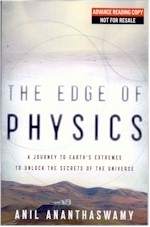 |
|
|
| ||||||
|
|
This page is the original source of this review, though you may also find it on Amazon or other sites. | ||
| Book Reviews Home | Free Audio Books | |
 |
Book Review of: The Edge of PhysicsA Journey to Earth's Extremes to Unlock the Secrets of the Universe Price:
$16.50 Availability: Usually ships
within 24 hours |
| Review
of
The Edge of Physics, by Anil Ananthaswamy (Softcover, 2010) (You can print this review in landscape mode, if you want a hardcopy) Reviewer: Mark Lamendola, author of over 6,000 articles. This book's title does not describe its contents. An accurate title for the book would have been "My Visits to Ten Sites Used for Astronomy and Physics Research." The subtitle hints at this, but only if you ignore that title. The author doesn't cover the edge of physics. He journals his visits to ten sites that have advanced equipment for astronomy or physics. He tosses in a little physics background, mostly string theory and precious little else. Unfortunately, Ananthaswamy works in journalism. So, he wrote a journal instead of a science book. This, despite a title that indicates the opposite. Today's "journalism" has an increasingly solid track record of agenda-driven, unbalanced writing. In keeping with this trend, Ananthaswamy wrote an unbalanced piece. I've read a fair number of other books on physics (written by researchers, not journalists with zero bona-fides on the subject) and watched several videos geared toward the more curious segment of the public. So, I'm aware of the subject's landscape. Ananthaswamy doesn't seem to share this awareness. Instead, he seems fixated on string theory. It's as if he read some books on it and hasn't read anything else on physics. While string theory is fascinating and complex, Ananthaswamy:
Balanced coverage of the leading theories that are on the edge of physics would have resulted in a much better book. To fit this in the same page count, the book would need to focus on the core topic without all of the off-topic material that should have been cut anyhow. In places, I wondered what the heck the author's ramblings had to do with the subject--and I'm still wondering. One good approach in the editing process would have been to remove the string theory comments from the narrative and write an appendix summarizing the leading theories. Then, re-title the book so it reflects the content. This way, the title actually fits the book and if you're interested in the background science you can read an overview.
Some positives:
This book would make a nice introduction for someone newly interested in what's going on with the General Theory of Relativity today and what it's like to visit some of the sites where experiments and research are taking place. It does not take you to the edge of physics, though it does take you to some edgy places in remote, hostile locations. This book consists of ten chapters, each of which is devoted to describing the author's visit to a particular research site. Chapter 8, for example, journals his visit to Antarctica. | |
About these reviewsYou may be wondering why the reviews here are any different from the hundreds of "reviews" posted online. Notice the quotation marks? I've been reviewing books for sites like Amazon for many years now, and it dismays me that Amazon found it necessary to post a minimum word count for reviews. It further dismays me that it's only 20 words. If that's all you have to say about a book, why bother? And why waste everyone else's time with such drivel? As a reader of such reviews, I feel like I am being told that I do not matter. The flippancy of people who write these terse "reviews" is insulting to the authors also, I would suspect. This sound bite blathering taking the place of any actual communication is increasingly a problem in our mindless, blog-posting Webosphere. Sadly, Google rewards such pointlessness as "content" so we just get more if this inanity. My reviews, contrary to current (non) standards, actually tell you about the book. I always got an "A" on a book review I did as a kid (that's how I remember it anyhow, and it's my story so I'm sticking to it). A book review contains certain elements and has a logical structure. It informs the reader about the book. A book review may also tell the reader whether the reviewer liked it, but revealing a reviewer's personal taste is not necessary for an informative book review. About your reviewer
About reading styleNo, I do not "speed read" through these. That said, I do read at a fast rate. But, in contrast to speed reading, I read everything when I read a book for review. Speed reading is a specialized type of reading that requires skipping text as you go. Using this technique, I've been able to consistently "max out" a speed reading machine at 2080 words per minute with 80% comprehension. This method is great if you are out to show how fast you can read. But I didn't use it in graduate school and I don't use it now. I think it takes the joy out of reading, and that pleasure is a big part of why I read. |
| |||||